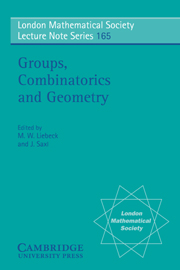Book contents
- Frontmatter
- Contents
- Authors' Addresses
- Introduction
- Part 1 Sporadic groups
- Part 2 Moonshine
- Part 3 Local and geometric methods in group theory
- Part 4 Geometries and related groups
- Part 5 Finite and algebraic groups of Lie type
- 22 Some remarks on the structure of finite subgroups of simple algebraic groups
- 23 Some (almost) multiplicity-free coset actions
- 24 Orbits in internal Chevalley modules
- 25 Subgroups of finite and algebraic groups
- 26 Irreducible representations of finite Chevalley groups containing a matrix with a simple spectrum
- 27 Overgroups of unipotent elements in simple algebraic groups
- Part 6 Finite permutation groups
- Part 7 Further aspects of simple groups
- Part 8 Related topics
23 - Some (almost) multiplicity-free coset actions
Published online by Cambridge University Press: 07 September 2010
- Frontmatter
- Contents
- Authors' Addresses
- Introduction
- Part 1 Sporadic groups
- Part 2 Moonshine
- Part 3 Local and geometric methods in group theory
- Part 4 Geometries and related groups
- Part 5 Finite and algebraic groups of Lie type
- 22 Some remarks on the structure of finite subgroups of simple algebraic groups
- 23 Some (almost) multiplicity-free coset actions
- 24 Orbits in internal Chevalley modules
- 25 Subgroups of finite and algebraic groups
- 26 Irreducible representations of finite Chevalley groups containing a matrix with a simple spectrum
- 27 Overgroups of unipotent elements in simple algebraic groups
- Part 6 Finite permutation groups
- Part 7 Further aspects of simple groups
- Part 8 Related topics
Summary
In this paper we shall be concerned with the decomposition of the permutation characters of coset actions of a certain type. Specifically, we let G be a connected reductive algebraic group over an algebraically closed field K of characteristic p > 0, and σ be a Frobenius map of G: for convenience we set F = σ2, and write Gσ and GF for the groups of fixed points. The action with which this paper deals is then that of GF on cosets of Gσ: this covers actions such as G(q2) on G(q) and (where appropriate) G(q2) on 2G(q2). We find that actions of this sort are either almost or actually multiplicity-free (an action is said to be multiplicity-free if no irreducible constituent of the permutation character occurs more than once): moreover some which are not multiplicity-free can be made so by the application of outer automorphisms. We shall classify precisely which almost simple actions of this type are multiplicity-free in Theorems 4, 10 and 11: these results are used in. The material that follows is taken from the author's Ph.D. thesis: we also mention a recent preprint of Kawanaka which covers very similar ground.
Preliminaries
If H is a finite group, we shall denote by Ĥ the set of (complex) irreducible characters of H. We shall mainly use the standard notation for finite groups of Lie type as given in. However, in a few instances we employ a slight modification, necessitated by our use of more than one Frobenius map.
Information
- Type
- Chapter
- Information
- Groups, Combinatorics and Geometry , pp. 292 - 310Publisher: Cambridge University PressPrint publication year: 1992
Accessibility standard: Unknown
- 1
- Cited by
